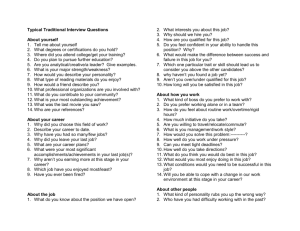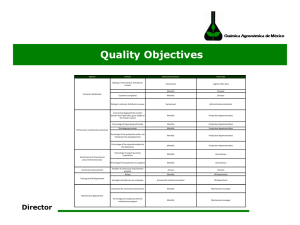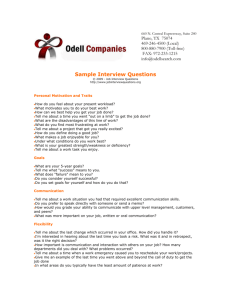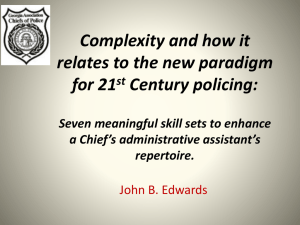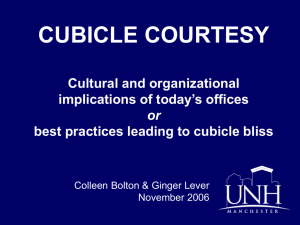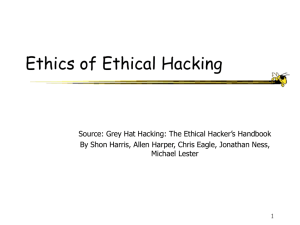Definition - Student Sample 2
advertisement
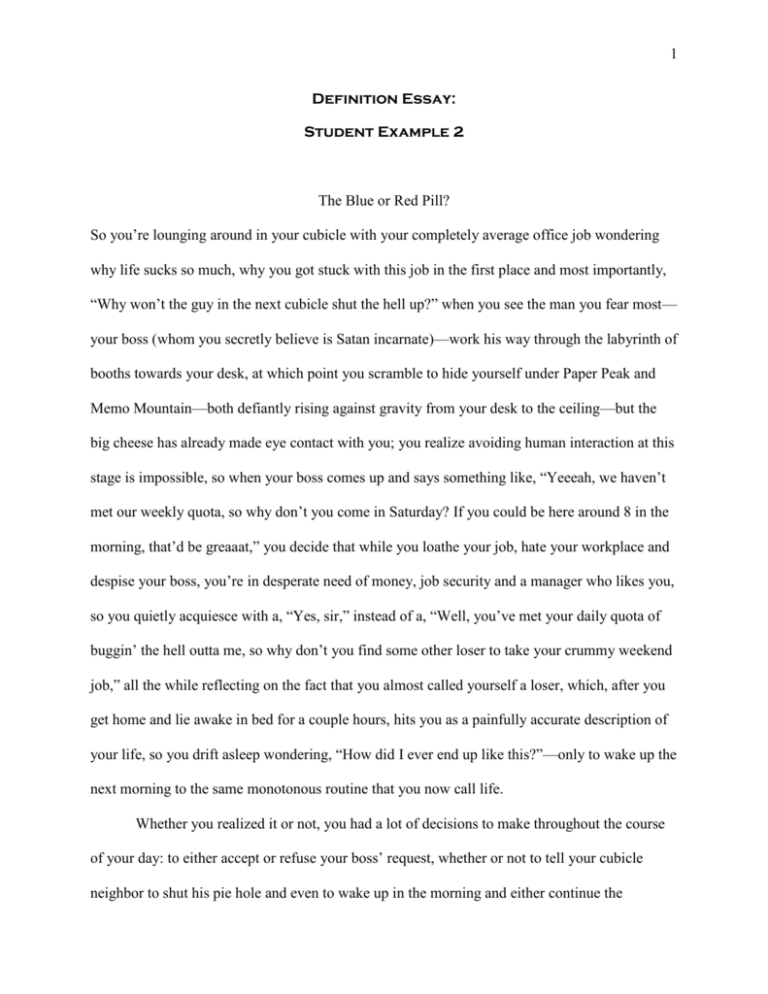
1 Definition Essay: Student Example 2 The Blue or Red Pill? So you’re lounging around in your cubicle with your completely average office job wondering why life sucks so much, why you got stuck with this job in the first place and most importantly, “Why won’t the guy in the next cubicle shut the hell up?” when you see the man you fear most— your boss (whom you secretly believe is Satan incarnate)—work his way through the labyrinth of booths towards your desk, at which point you scramble to hide yourself under Paper Peak and Memo Mountain—both defiantly rising against gravity from your desk to the ceiling—but the big cheese has already made eye contact with you; you realize avoiding human interaction at this stage is impossible, so when your boss comes up and says something like, “Yeeeah, we haven’t met our weekly quota, so why don’t you come in Saturday? If you could be here around 8 in the morning, that’d be greaaat,” you decide that while you loathe your job, hate your workplace and despise your boss, you’re in desperate need of money, job security and a manager who likes you, so you quietly acquiesce with a, “Yes, sir,” instead of a, “Well, you’ve met your daily quota of buggin’ the hell outta me, so why don’t you find some other loser to take your crummy weekend job,” all the while reflecting on the fact that you almost called yourself a loser, which, after you get home and lie awake in bed for a couple hours, hits you as a painfully accurate description of your life, so you drift asleep wondering, “How did I ever end up like this?”—only to wake up the next morning to the same monotonous routine that you now call life. Whether you realized it or not, you had a lot of decisions to make throughout the course of your day: to either accept or refuse your boss’ request, whether or not to tell your cubicle neighbor to shut his pie hole and even to wake up in the morning and either continue the 2 perpetual cycle of work, eat, and sleep or to finally tell your boss you’re through with to orders from him. With each of these situations, you weighed your options—consciously or not—and picked what you thought would have the best outcome. However, various alternatives were always open to you whether or not you knew about them. Because of these different options, we can see people’s lives are filled with choices, which are the minor and major decisions they can make in their lives. Choices are the different conclusions people can come to. The Online Etymology Dictionary says the word traces its origins back to the 1300’s, back to the Old French word chois, which comes from the verb choisir meaning “to choose.” If the verb means to choose something, then the noun could refer to the things that could have been chosen. Choice also comes from the Gothic word kausjan, which is to taste or test. Often times you’ll need to pick something from a combination of things in order to taste or test it. It’s a bit of a stretch, but this could also show how choice is possibly related to kausjan. Choice appears as though it at least partially reflects the meanings of its predecessors. Some choices are the minor decisions you make in your daily life. Usually they have a relatively insignificant effect in your overall life since they don’t have a constant affect on how you act or what you believe. For instance, many people have three choices first thing in the morning: waking up to the alarm clock, resting for “five” more minutes, or completely ignoring that irritating morning buzz. Then they decide when to get out of the shower (if that even), what clothes to wear (if they should match or not), what to eat for breakfast (if there’s even time)… the list just goes on. Granted, some of these things could negatively impact your day—going to school without showering might cause your classmates to back away from you—but chances are the next day would be entirely different. Also, many times these decisions aren’t hard to make 3 because they happen all the time. People might go the same route to work or school everyday, or they might have their own morning routine. It’s not like it’s a struggle for me to brush my teeth; I always brush back and forth rather than up and down. I’m thankful though that some of the choices I make are minor; imagine how crazy life would be if every time I brushed my teeth I experienced a life changing event. However, other choices are major decisions that can make a huge impact on your life. Many of these choices influence a person’s beliefs. Religion heavily sways a person’s attitude in life. Christians tend to hold certain similar beliefs such as in the Holy Trinity, against abortion and in creationism (as in the world was created by God). Muslims guide their thoughts with the Five Pillars of Islam. Basing your life around beliefs such as these is certainly not as easy a choice as, say, picking which cereal you want to eat for breakfast, especially because it isn’t an everyday decision. Some of these choices also involve a person’s morals. Take me for example, someone who just might end up in that dreaded office job as a computer programmer. With enough experience, I could become a white hat hacker. Though hacker has a negative connotation for many people, being a white hat hacker wouldn’t mean I break into companies’ computers to cause chaos. Rather, I would help secure computers from outside intruders by working with companies to expose and fix any weaknesses in their virtual defense. Or, I could join the “dark side” and become a black hat hacker; I could actually be someone that assaults companies through cyberspace. While I personally don’t see the fun in following Anakin Skywalker’s path—I feel it’d be much more pleasing to stop people when they think they’ve got the skills to do something bad—there are people who thrive on the mischief they cause. Major choices like these are significant since beliefs and morals shape people’s character. 4 People pick between choices—the decisions they could pick—all the time. I’ve heard many people gripe about things they “have” to do. These complaints come in many forms: “I had to do my chores yesterday,” “I have to go to school today,” or the infamous, “I have to write a paper for tomorrow.” It’s like they just accept that they have to do something they don’t like, as if they’re oblivious to the idea of skipping their chores, playing hooky or failing to start/finish their paper. I realize that the consequences of these actions could be highly unfavorable— especially that last one in my case—but that doesn’t mean the possibilities don’t exist. If they don’t like something, they could pick between minor choices like “to do or not to do.” Better yet, they could decide between something more significant, like either sailing blindly on a ship with Life at the helm, or having Life ask them, “Where to now, oh Captain, my Captain?”

